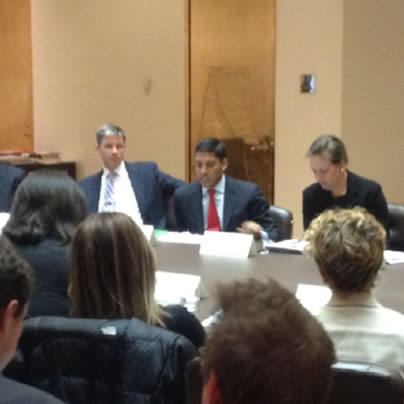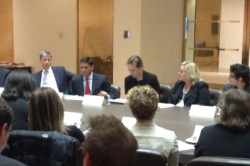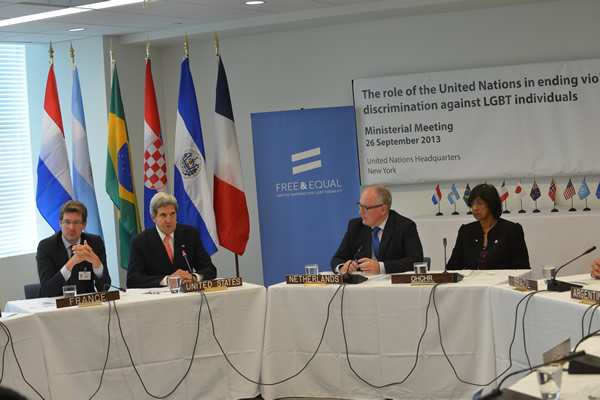News
LGBT issues discussed at first-of-its-kind U.N. meeting
Funders of global gay initiatives met in NYC, Kerry signs onto declaration


USAID Administrator Rajiv Shah is among those who attended a meeting of global LGBT funders on September 24 during the U.N. General Assembly in New York. (Photo courtesy of USAID.)
USAID, the Swedish International Development Corporation Agency (SIDA,) the Astraea Lesbian Foundation for Justice and the Ford Foundation on Tuesday hosted a meeting of funders of global LGBT advocacy efforts.
USAID Administrator Rajiv Shah, SIDA Director General Charlotte Petri Gornitzka and former Planet Out CEO Megan Smith, who is now vice president of Google[x], attended the gathering alongside high level officials from Austria, Denmark, Finland, Norway, Swedish, the United Kingdom, the U.N. Development Program, the State Department and the World Bank.
Representatives from the American Jewish World Service, the Arcus Foundation, the Fund for Global Rights, the Gay & Lesbian Victory Institute, the Dutch foundation Mama Cash, the National Gay and Lesbian Chamber of Commerce, the Open Society Foundation and the Swedish Federation for Lesbian, Gay, Bisexual and Transgender Rights are among the other groups that took part in the meeting. Organizers said it drew 85 percent of groups around that contribute to global LGBT efforts.
“It was a seminal moment in history because it is the first global meeting where public and private donors for LGBT equality came together to discuss priorities, programs and potential collaboration for ways forward,” senior USAID advisor Claire Lucas told the Washington Blade on Friday.
USAID in April announced the LGBT Global Development Partnership with the Gay & Lesbian Victory Institute, (SIDA) and other groups will contribute $11 million over the next four years to advocacy groups in Honduras and other developing countries. The initiative’s first two trainings took place in the Colombian cities of Cartagena and Bogotá late last month and in the spring respectively.
Denis Dison of the Gay and Lesbian Victory Institute added his organization remains “proud” to “partner in this work” with USAID and Astraea as he discussed Tuesday’s meeting with the Blade.
“This meeting was an important step in recognizing the truly global effort to advance LGBT human rights, and the leadership role now being played by the U.S. is a remarkable turnaround from just a few years ago,” he said.
Funders of global LGBT initiatives met in New York two days before Secretary of State John Kerry and representatives from 10 countries issued a declaration that calls for an end to anti-LGBT violence and discrimination.
Members of the LGBT Core Group at U.N. that includes the European Union High Representative for Foreign Affairs and Security Policy Catherine Ashton and ministers from Argentina, Brazil, Croatia, El Salvador, France, Israel, Japan, the Netherlands, New Zealand and Norway declared their “strong and determined commitment to eliminating violence and discrimination against individuals based on their sexual orientation and gender identity.”
“We reaffirm our conviction that human rights are the birthright of every human being,” the statement reads. “Those who are lesbian, gay, bisexual and transgender (LGBT) must enjoy the same human rights as everyone else.”
Acting Assistant Secretary of State for the Bureau of International Affairs Dean Pittman told the Blade during an interview from New York on Friday the meeting and the declaration underscores the U.N. and the U.S. are committed to “pursuing and advancing LGBT rights around the world.”
“Everybody’s reinforced the idea that everyone deserves human rights,” Pittman said. “It shouldn’t be a decision of who you are, who you love, what your gender is.”
Pittman further categorized the statement as “really strong, powerful.”
“This really has a ripple effect that sort of goes out through LGBT communities around the world who see this as sort of a vote of confidence,” he told the Blade. “[It] sort of gives them the ability to go into their own communities with the backing of a global organization like the U.N. to pursue some of these human rights issues in their own countries.”
The meeting took place two months after the U.N. officially launched a public campaign that seeks to increase support for LGBT rights around the world. It’s been endorsed by singer Ricky Martin and others.
More than 70 countries around the world continue to criminalize consensual same-sex sexual acts in spite of a 2011 resolution in support of LGBT rights the U.N. Human Rights Council passed. Gambian President Yahya Jammeh on Friday said in his speech during the U.N. General Assembly that homosexuality is among the three “biggest threats to human existence” as the Associated Press reported.
85 countries have also backed a U.N. General Assembly declaration in support of LGBT rights.
President Obama earlier this month met with two Russian LGBT rights advocates during the G-20 summit. Both he and Kerry have also criticized Russian President Vladimir Putin over his country’s LGBT rights record, which includes a law that bans gay propaganda to minors.
Pittman declined to say whether Kerry discussed Russia’s LGBT rights record during his meeting with Russian Foreign Minister Sergei Lavrov on Thursday during the U.N. General Assembly. He said Jessica Stern, executive director of the International Gay and Lesbian Human Rights Commission, briefed Kerry and other ministers on the country’s gay propaganda law before they issued their declaration.
“This is an issue we’ve raised with the Russians at many levels and repeatedly,” Pittman told the Blade. “It’s obviously unacceptable.
Council for Global Equality Chair Mark Bromley welcomed the meeting and the resolution.
“One would expect Syria and Iran to be on the agenda, but not necessarily human rights for LGBT people,” he told the Blade, referring to the U.N. General Assembly. “For a group of committed foreign ministers to come together during this time, including Sec. Kerry, to pledge collective action to respond to human rights abuses directed at LGBT communities worldwide is unprecedented.”
Chris Johnson contributed to this article.
India
India’s first transgender healthcare clinic reopens
Mitr Clinic closed after losing USAID funding

A U.S. Agency for International Development funding freeze in January forced the closure of India’s Mitr Clinic, the country’s first transgender healthcare facility, disrupting critical services for a vulnerable population.
Six months later, the clinic has reopened as Sabrang Clinic, reviving access to essential care for the transgender community.
Major Indian corporations, including some of the nation’s largest multinationals, stepped up with substantial financial support. Their backing has enabled Sabrang Clinic to resume its mission of delivering specialized, stigma-free medical services.
The former Mitr Clinic on May 2 reopened as the Sabrang Clinic. YR Gaitonde Center for AIDS Research and Education, an HIV/AIDS service organization, manages the facility.
The Sabrang Clinic sparked controversy in the U.S. when U.S. Sen. John Kennedy (R-La.) in February denounced its USAID funding, arguing that American taxpayer dollars should not support trans healthcare initiatives abroad. President Donald Trump amplified the criticism, labeling the agency’s spending on such programs as “wasteful” and aligning with his administration’s broader push to curb federal support for gender-affirming care. White House press secretary Karoline Leavitt further fueled the debate, citing the clinic’s funding as part of a pattern of USAID’s “radical” expenditures, while House Speaker Mike Johnson (R-La.) echoed the sentiment, decrying similar international projects as misaligned with American priorities.
Elon Musk, who until May led the Department of Government Efficiency, added to the controversy surrounding the clinic.
“That’s what American tax dollars were funding,” he said in a Feb. 28 X post.
His remark, made before his departure from the Trump-Vance administration, spotlighted the clinic’s USAID support, intensifying debates over its role in delivering trans healthcare in India.
The Washington Blade on Feb. 27 detailed how the USAID funding freeze crippled Mitr Clinic’s operations, spotlighting the broader fallout for South Asian LGBTQ organizations.
The Blade noted the clinic, a vital resource for trans healthcare in India, faced abrupt closure alongside groups in Nepal, Bangladesh, and Pakistan, as the freeze slashed support for programs addressing HIV/AIDS, mental health, and gender-based violence, leaving thousands without access to essential services.
The U.S. President’s Emergency Plan for AIDS Relief (PEPFAR) and USAID in 2021 launched Program ACCELERATE, spearheaded by the Johns Hopkins University School of Medicine, to establish Mitr Clinic in Hyderabad in Telangana State. As India’s first comprehensive healthcare center for the trans community, the facility offered tailored medical services, including HIV/AIDS treatment and mental health support, filling a critical gap in the region’s healthcare landscape.
Sabrang Clinic serves a critical role for India’s estimated one million trans people, a population facing a disproportionate HIV/AIDS burden.
A 2019 Reuters report noted a 3.1 percent HIV prevalence among trans people, translating to roughly 31,000 individuals living with the virus, compared to the national adult rate of 0.26 percent. Similarly, a 2021 UNAIDS report cited a 3.8 percent prevalence, suggesting approximately 38,000 trans people with HIV/AIDS.
Internal reports indicate the clinic since it opened in 2021 has served more than 3,000 patients. It has become a model of community-led care that fosters trust and addresses the unique health needs of trans people in Hyderabad.
When USAID funding cuts forced Sabrang Clinic’s closure, scores of people and LGBTQ community members in Hyderabad were left without access to reliable, stigma-free healthcare. Undaunted, the clinic’s trans-led team pivoted to virtual consultations and medication delivery, sustaining critical support for patients until corporate funding revived operations.
Tata Trusts, a philanthropic arm of India’s Tata conglomerate, in April pledged to fund the clinic for three years.
The Hindu, a leading Indian English-language newspaper, reported the trust committed approximately $18 per person a year to sustain the clinic’s operations. This contrasts with the earlier USAID program, which had provided about $23 per person each year.
Tata Trusts covers the salaries of Sabrang Clinic’s core medical staff, while its leadership positions are jointly funded by Tata and the clinic’s parent organization. The clinic is now pursuing partnerships with additional donors to expand its trans-focused healthcare services.
“We are elated to continue this service, as we have always believed that sexual minorities deserve respect and their right to self-expression,” said YRGCARE Chief Operating Officer A.K. Srikrishnan. “That’s why we launched Mitr Clinic under Project ACCELERATE in 2021, and it operated until January 2025. The Trump administration’s USAID funding withdrawal forced a shutdown, but we have no comment on that. Fortunately, with great vigor, we secured support from Tata Trusts to sustain Sabrang Clinic. The name change to Sabrang, also called ‘Help for All,’ was simply to reposition the brand, with no deeper logic attached.”
Srikrishnan told the Blade that YRGCARE will aim to raise additional crowdfunding and support if the current funding proves insufficient to maintain the same level of services at the clinic. Srikrishnan also thanked Tata Trusts for its support.
“We want to expand it throughout the country given the choice,” said Srikrishnan. “If someone were to tell us, ‘Can you run it across the country?’ we would certainly love to do it.”
“Sexual minorities are a reality, and however much someone wishes them away, they exist and need to exist with the respect and rights they deserve,” added Srikrishnan. “We do not differentiate between local and foreign contributions; when we needed it most, Tata Trusts stepped in and helped. So we are certainly grateful to them.”
District of Columbia
Gay ANC member announces candidacy for Ward 1 D.C. Council seat
Community leader Brian Footer seeking seat held by Brianne Nadeau

Gay Advisory Neighborhood Commissioner Brian Footer, a community activist who has been involved for many years in local and national government affairs, has announced his candidacy for the Ward 1 D.C. Council seat up for election in 2026.
Footer, a Democrat, will be running in the city’s June 2, 2026, Democratic primary for the Ward 1 Council seat, but it is uncertain whether he will be running against incumbent Ward 1 Council member Brianne Nadeau (D). Nadeau has not yet announced if she plans to run for re-election for a fourth term following her 12 years on the Council.
Nadeau has been a longtime vocal supporter of the LGBTQ community.
If Footer were to win the primary and the November 2026 general election, he would become the Council’s second openly gay member. Ward 5 Council member Zachary Parker (D) is currently the 13-member Council’s only gay member.
Footer is a three-term ANC commissioner who currently serves as Chair of ANC 1E, which represents the city’s Adams Morgan neighborhood.
“Brian has worked at every level of government — federal, state, and local — building a career rooted in public service, aging policy, and inclusive urban planning,” a statement on his campaign website says.
“I’m running for Council because too many people in Ward 1 are doing everything right and still feel ignored by the city they call home,” Footer states on his website.
“I’m running because we can do better,” his statement continues. “That means making housing more affordable, addressing homelessness with real solutions, and keeping our neighborhoods safe with smart, community focused strategies.”
When contacted by the Washington Blade for comment, Nadeau said she was not ready at this time to discuss her plans about running again or about Footer’s candidacy.
“The primary is a ways away, and I’m very focused right now on the budget and the stadium deal and all the work that we’re doing at the Council,” she told the Blade. “So, I really haven’t had time to turn to my plans. So, as a result, I’m also not going to be commenting on anybody else who is determined that they’re running at this time.”
She first won election to the Council in 2014 after she defeated four-term gay Ward 1 Council member Jim Graham in the Democratic primary after Graham became embroiled in an ethics controversy.
In the 2022 Democratic primary Nadeau defeated gay challenger Salah Czapary in a three-candidate race, by a margin of 48.5% of the vote compared to Czapary’s 30.9%.
With the third candidate, Sabel Harris, receiving 20.4%, the outcome showed that the two challengers had a combined total vote count higher than Nadeau.
Further details of Footer’s candidacy can be accessed from his campaign website, brianfooterdc.com.
Spain
Spanish women detail abuses suffered in Franco-era institutions
Barcelona-based photographer Luca Gaetano Pira created ‘Las Descarriadas’ exhibit

A Barcelona-based photographer, audiovisual artist, and activist has created an exhibit that profiles Spanish women who suffered abuse in institutions that Gen. Francisco Franco’s dictatorship established.
Luca Gaetano Pira, who is originally from Italy, spoke with women who the regime, which governed Spain from 1936-1975, sent to Women’s Protection Board institutions.
The regime in 1941 created the board the country’s Justice Ministry oversaw.
Franco named his wife, Carmen Polo, as the board’s honorary president. Then-Prime Minister Felipe González fully dissolved the board in 1985, a decade after Franco’s death.
Gaetano’s exhibit is called “Las Descarriadas” or “The Misguided Women” in English.
“These are women who were detained between 1941 and 1985 for reasons that are unthinkable today: being lesbian, poor, pregnant out of wedlock, rebellious, politically active … or simply considered ‘morally suspect,'” Gaetano noted to the Washington Blade.
Groups affiliated with the Spanish Catholic Church ran these institutions. Gaetano pointed out they were “presented as social assistance centers.”
“In reality, they were spaces of punishment and forced reeducation, where isolation, unpaid work, and psychological violence were the norm,” he said. “Many of the survivors are still alive. Their testimonies are powerful, urgent, and of extraordinary current relevance.”
The regime sent more than 40,000 women to Women’s Protection Board institutions.
“Despite its seemingly benevolent name, it was in fact one of the most powerful instruments of moral and social control over women during and after the dictatorship,” notes the exhibit. “Under the guise of care and re-education, this institution functioned as a repressive apparatus that punished women who deviated from the ideal feminine model imposed by Franco’s regime: submissive, obedient, married, and dedicated to motherhood within the Catholic family structure.”
The Spanish Catholic Church last month issued a public apology, but Gaetano described it as “very soft” and noted “the women did not accept it.” Gaetano also compared the Women’s Protection Board institutions to Ireland’s Magdalene Laundries.
The Associated Press notes tens of thousands of “fallen” women were sent to the laundries that Catholic nuns operated in Ireland from the 18th century until the mid-1990s. Then-Irish Prime Minister Edna Kenny in 2013 issued a formal apology for the abuses that women suffered in the laundries and announced the government would compensate them.
The Spanish government has yet to offer compensation to the women abused in Women’s Protection Board institutions.
“My work focuses on recovering the historical memory of marginalized communities, particularly through the portrayal of survivors of institutional violence and the use of archival materials,” Gaetano told the Blade, noting he has also sought to highlight the repression that LGBTQ people suffered during dictatorships in Portugal and Latin America.
Gaetano’s exhibit can be found here:
-

 Federal Government2 days ago
Federal Government2 days agoTreasury Department has a gay secretary but LGBTQ staff are under siege
-

 Virginia3 days ago
Virginia3 days agoDefying trends, new LGBTQ center opens in rural Winchester, Va.
-

 District of Columbia2 days ago
District of Columbia2 days agoGay GOP group hosts Ernst, 3 House members — all of whom oppose Equality Act
-

 District of Columbia2 days ago
District of Columbia2 days agoD.C. police seek public’s help in July 5 murder of trans woman










